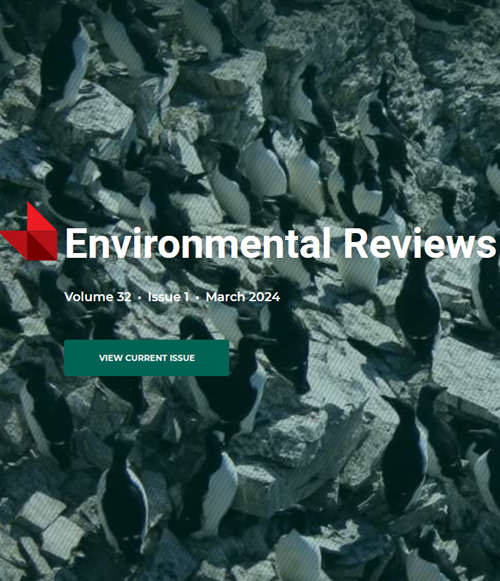A review of the non-indigenous Chinese mystery snail, Cipangopaludina chinensis (Viviparidae), in North America, with emphasis on occurrence in Canada and the potential impact on indigenous aquatic species
IF 5.1
3区 环境科学与生态学
Q2 ENVIRONMENTAL SCIENCES
引用次数: 4
Abstract
Evidence suggests that the Chinese mystery snail, Cipangopaludina chinensis, a freshwater, dioecious, snail of Asian origin has become invasive in North America, Belgium, and the Netherlands. Invasive species threaten indigenous biodiversity and have socioeconomic consequences where invasive. The aim of this review is to synthesize the relevant literature pertaining to C. chinensis in Canada. In doing so, we (i) describe C. chinensis ecosystem interactions in both indigenous (Asia) and non-indigenous habitats (North America and Europe), (ii) identify gaps in the literature, and (iii) determine where the species potential distribution in North America requires further exploration. We also briefly discuss potential management strategies for this species, as an aquatic invasive species (AIS), in Canada. Due to the much larger relative size of adult C. chinensis, multiple feeding mechanisms, and resistance to predation, C. chinensis can out-compete and displace indigenous freshwater gastropods and other molluscs. Furthermore, C. chinensis can affect food webs through bottom-up interactions with the bacterial and zooplankton communities by changing nitrogen and phosphorous concentrations. Also, the Chinese literature indicates the potential for C. chinensis to act as a biotransfer of contaminants between polluted ecosystems and consumers. In its indigenous range, C. chinensis was identified as a host for numerous parasites harmful to human and animal consumers alike. A comparison of the Canadian geographical distribution of reported occurrences with that for the United States indicates several potential gaps in Canadian reporting, which merits further investigation and consideration, especially in regard to federal and provincial non-indigenous monitoring and regulations. Southern Ontario had the highest number of reports that were mostly from web-based photo-supported sources. This suggests that interactive citizen science through popular apps backed by well-supported educational campaigns may be a highly effective means of tracking C. chinensis spread, which can be complementary to traditional methods using specimen-vouchered taxonomically verified natural-history collections overseen by professional curators.本文综述了中国非本土神秘蜗牛Cipangopaludina chinensis(胎螺科)在北美的研究进展,重点介绍了其在加拿大的分布及其对本土水生物种的潜在影响
有证据表明,中国神秘蜗牛,Cipangopaludina chinensis,一种起源于亚洲的淡水、雌雄异株蜗牛,已经入侵了北美、比利时和荷兰。入侵物种威胁着当地的生物多样性,并在入侵地产生社会经济后果。本文综述了有关加拿大中华月桂的相关文献。在此过程中,我们(i)描述了中国ensis在本地(亚洲)和非本地栖息地(北美和欧洲)的生态系统相互作用,(ii)确定文献中的空白,(iii)确定物种在北美的潜在分布需要进一步探索。我们还简要讨论了该物种作为水生入侵物种(AIS)在加拿大的潜在管理策略。由于成虫相对体型较大,摄食机制多样,且对捕食动物具有抗性,因此可以与本地淡水腹足类和其他软体动物竞争并取代它们。此外,紫菜通过改变氮磷浓度,自下而上地与细菌和浮游动物群落相互作用,进而影响食物网。此外,中国文献表明,羊草有可能在受污染的生态系统和消费者之间作为污染物的生物转移。在其本土范围内,被鉴定为许多对人类和动物都有害的寄生虫的宿主。将加拿大报告的事件的地理分布与美国的地理分布进行比较,可以看出加拿大报告中存在一些潜在的差距,值得进一步调查和审议,特别是在联邦和省级非土著监测和条例方面。南安大略的报告数量最多,大部分来自基于网络的图片支持来源。这表明,通过受欢迎的应用程序进行互动的公民科学,并辅以良好的教育活动,可能是追踪中国古猿传播的一种非常有效的手段,它可以补充传统的方法,即使用由专业馆长监督的标本证明的分类验证的自然历史收藏。
本文章由计算机程序翻译,如有差异,请以英文原文为准。
求助全文
约1分钟内获得全文
求助全文
来源期刊

Environmental Reviews
环境科学-环境科学
自引率
3.50%
发文量
45
期刊介绍:
Published since 1993, Environmental Reviews is a quarterly journal that presents authoritative literature reviews on a wide range of environmental science and associated environmental studies topics, with emphasis on the effects on and response of both natural and manmade ecosystems to anthropogenic stress. The authorship and scope are international, with critical literature reviews submitted and invited on such topics as sustainability, water supply management, climate change, harvesting impacts, acid rain, pesticide use, lake acidification, air and marine pollution, oil and gas development, biological control, food chain biomagnification, rehabilitation of polluted aquatic systems, erosion, forestry, bio-indicators of environmental stress, conservation of biodiversity, and many other environmental issues.
 求助内容:
求助内容: 应助结果提醒方式:
应助结果提醒方式:


